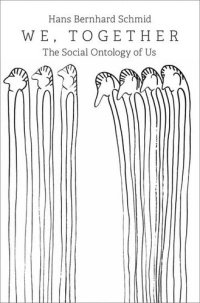
Ebook: We, Together: The Social Ontology of Us
Author: Hans Bernhard Schmid
- Publisher: Oxford University Press
- Language: English
- pdf
Who are we and what do we do as agents living together?
In We, Together, Hans Bernhard Schmid argues, first, that our living together is a joint activity. Joint activities involve shared intentions, and shared intentions have plural intentional subjects. We are, thus, the plural subjects of our shared intentions in the same way as we are the singular subjects of our individual intentions: through pre-reflective self-awareness. Just as there is no substantive, singular "self," "I," or ego, there is no substantive "we." In order to understand who we are, together, it is important to see that intentional subjects are a feature of intentionality.
Schmid continues with the assertion that the social worlds of roles and statuses, norms and structures, institutions and artifacts are our ways of living together. As such, the social worlds are determined neither by Nature nor Gods, but by us. What can be harmful, Schmid writes, is our frequent and systematic failure to understand our own place as both creatures and creators of social worlds. This brings We, Together back to our existence as plural intentional subjects. How we live together is up to us, together. The book suggests that understanding this might enable us to do better--to live well, better, together.
In We, Together, Hans Bernhard Schmid argues, first, that our living together is a joint activity. Joint activities involve shared intentions, and shared intentions have plural intentional subjects. We are, thus, the plural subjects of our shared intentions in the same way as we are the singular subjects of our individual intentions: through pre-reflective self-awareness. Just as there is no substantive, singular "self," "I," or ego, there is no substantive "we." In order to understand who we are, together, it is important to see that intentional subjects are a feature of intentionality.
Schmid continues with the assertion that the social worlds of roles and statuses, norms and structures, institutions and artifacts are our ways of living together. As such, the social worlds are determined neither by Nature nor Gods, but by us. What can be harmful, Schmid writes, is our frequent and systematic failure to understand our own place as both creatures and creators of social worlds. This brings We, Together back to our existence as plural intentional subjects. How we live together is up to us, together. The book suggests that understanding this might enable us to do better--to live well, better, together.
Download the book We, Together: The Social Ontology of Us for free or read online
Continue reading on any device:

Last viewed books
Related books
{related-news}
Comments (0)